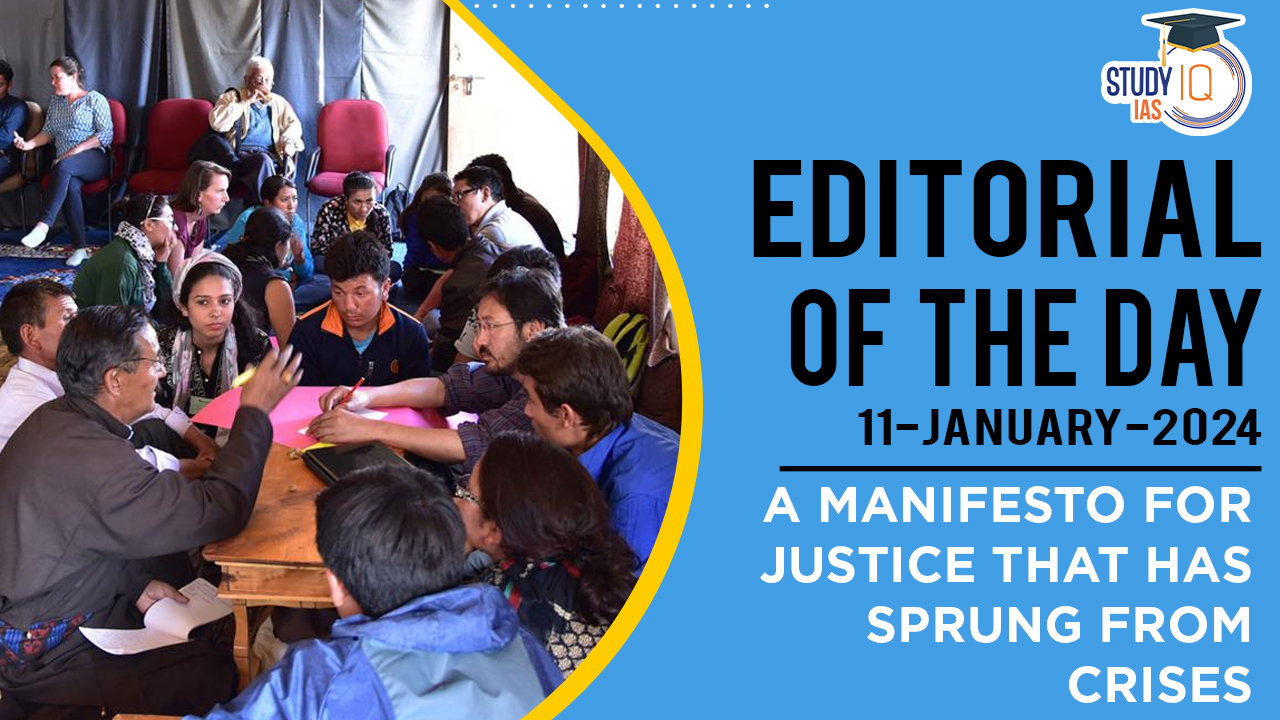Table of Contents
Context: India faces multiple crises, including unemployment and ecological collapse. The ‘People’s Manifesto’ by Vikalp Sangam offers alternative solutions focusing on sustainable development and democratic rights, challenging current policies.
The Challenges Faced By Indian Society
- Unemployment: A severe and growing issue, particularly among the youth.
- Example- The desperate attempt by unemployed individuals to gatecrash Parliament to highlight their plight
- Social and Cultural Strife: Increasing inter-faith and inter-ethnic conflicts, and vulnerabilities of minorities.
- Example- Conflict in Manipur
- Ecological Collapse: Environmental degradation, impacting water sources, and biodiversity, and leading to erratic weather patterns.
- Example- The sinking of Joshimath and the dam burst in Sikkim, indicative of environmental degradation and mismanagement.
- Erosion of Democratic Rights: Suppression of democratic voices, misuse of laws against activists, journalists, and lawyers, and suspension of opposition parliamentarians.
- Economic and Political Inequality: Large industry dominance, extreme wealth disparities, and a substantial black economy.
We’re now on WhatsApp. Click to Join
Solutions To Address The Challenges
The ‘People’s Manifesto’ by Vikalp Sangam suggests several solutions to address the challenges faced by India:
- Economic Reforms:
- Prioritising small manufacturing, crafts, and value-added produce from agriculture, forestry, fisheries, and pastoralism.
- Extending the National Rural Employment Guarantee Act to urban areas.
- Reserving goods and services producible through handmade and small manufacturing for these sectors.
- Policy Level Shifts:
- Demanding curbs on the black economy.
- Reducing the salary gap between the highest and lowest earners.
- Implementing greater wealth and inheritance taxation for the rich.
- Introducing a basic income and pension for all workers.
- Democratic and Legal Reforms:
- Real devolution of financial and legal powers to village and urban assemblies.
- Full implementation of panchayat laws and comprehensive laws on state agency accountability, including mandatory public audits.
- Reviving the independence of institutions like the Election Commission and the media.
- Repealing misused laws such as the Unlawful Activities (Prevention) Act and The National Security Act.
- Social Equality and Cohesion:
- Creating forums for dialogue and restoring co-existence.
- Prioritising marginalised sections (women, Dalits, Adivasis, religious and sexual minorities, persons with disability) in all public and private institutions.
- Environmental Policy:
- Implementing a national land and water policy to protect ecological functions.
- Community-led conservation of wildlife and biodiversity.
- Extending rights to natural resources, akin to the Forest Rights Act, to other ecosystems.
- Transitioning to organic, biologically diverse farming by 2040 and reducing toxic products and non-biodegradable materials.
- Promoting decentralised water harvesting and renewable energy while phasing out fossil fuels and nuclear power by 2030.
- Reversing the weakening of environmental impact assessments and introducing sector-wide impact assessments.
| What Is Vikalp Sangam? |
| Vikalp Sangam is a collaborative platform that brings together various people’s movements and civil society organisations in India. It focuses on sharing and promoting alternative approaches to development that are sustainable, equitable, and just. |


 Securities Markets Code Bill 2025: Towar...
Securities Markets Code Bill 2025: Towar...
 Weakly Interacting Massive Particles (WI...
Weakly Interacting Massive Particles (WI...
 India–Oman Trade Deal: CEPA Signed to ...
India–Oman Trade Deal: CEPA Signed to ...

























